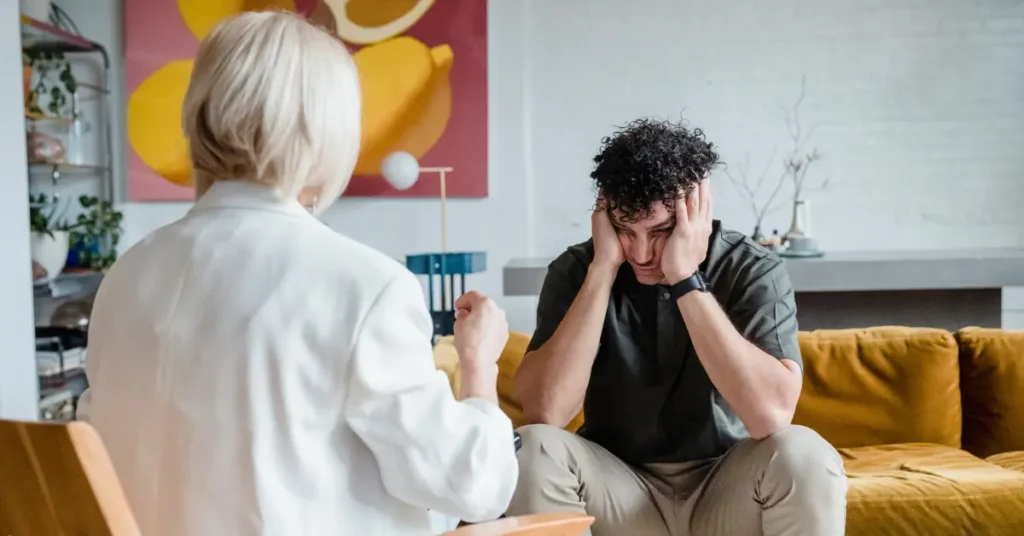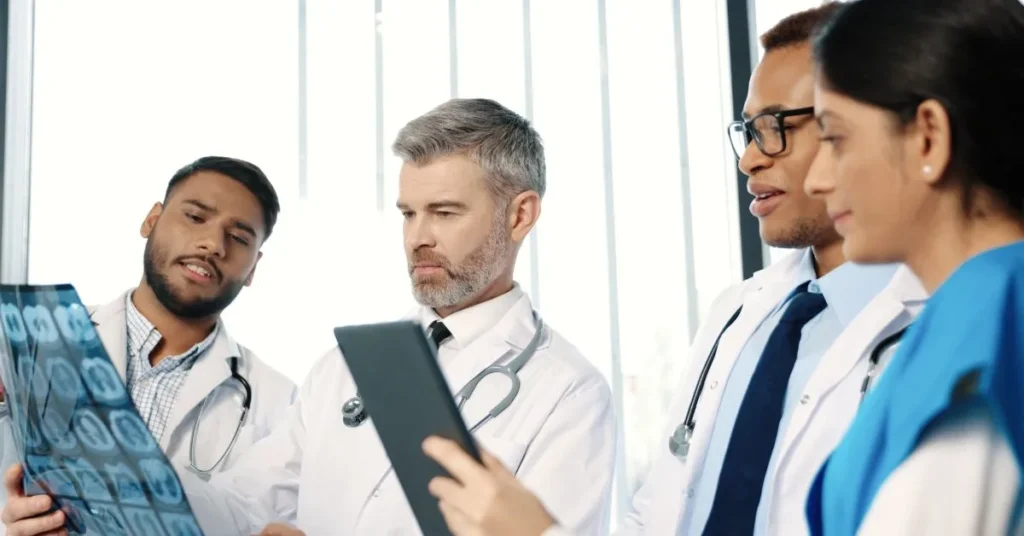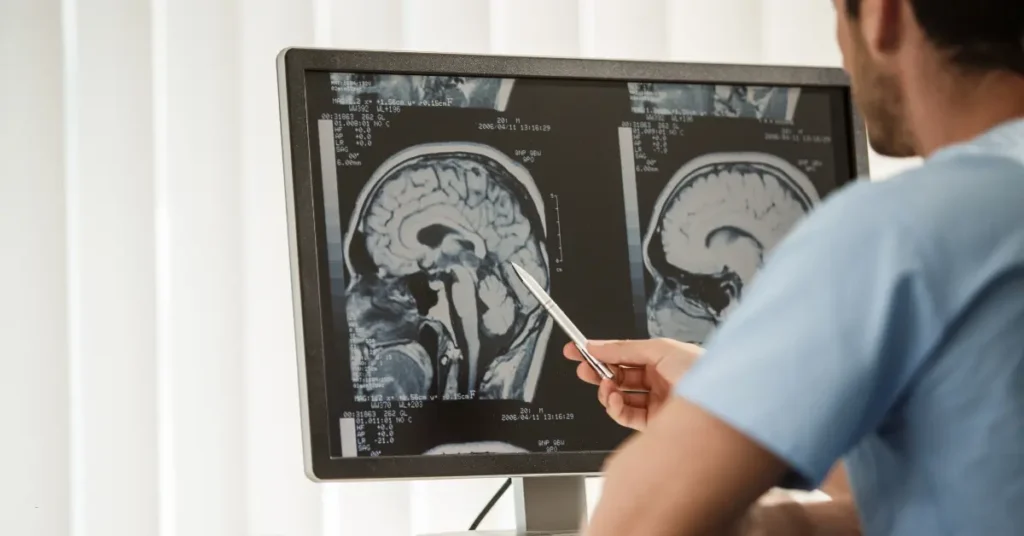Accelerated TMS Therapy: Rapid Depression Treatment In Just 5 Days or Less
Rapid relief from depression and anxiety—often in 5 days or less—is finally an option. This advanced approach allows for more TMS sessions in a shorter time, helping you feel better faster. Explore the benefits of Accelerated TMS today at Bespoke Treatment.
Book OnlineAccelerated TMS For Depression
Transcranial Magnetic Stimulation (TMS) is a safe and non-invasive treatment for depression. Similar to an MRI machine, it uses magnetic pulses to stimulate underactive areas of the brain in individuals with various mental health conditions such as major depression, bipolar disorder, obsessive-compulsive disorder (OCD), post-traumatic stress disorder, and generalized anxiety disorder, among others. Accelerated TMS treatment is a more intensive approach, offering faster relief for those suffering from severe symptoms. If you’ve tried anti-depressants and SSRIs with mixed results and unpleasant side effects, please schedule a consult with our specialists to see if accelerated TMS therapy is right for you. Thousands of depression sufferers who have tried everything are finding amazing outcomes with accelerated TMS. For many, it’s the only approach that is effective against treatment-resistant depression.
At Bespoke Treatment, our office locations in downtown Los Angeles and Santa Monica, our experienced psychiatric specialists specialize in drug-free treatments. A typical comprehensive TMS treatment consists of sessions five days a week for approximately six weeks, followed by an additional 6 sessions over the following two weeks for approximately 36 sessions. This FDA-approved treatment has shown great success in various mental health conditions, and has even been approved for adolescent depression in 2024.
For the past two decades, scientists in the research community have realized that the schedule of TMS Therapy does not work for many people. After all, it can be difficult for many to commit to showing up for TMS appointments each day of the week while juggling school, work, or family obligations. Additionally, many people live in areas without a local TMS provider near them.
Accelerated TMS and SAINT TMS
Unlike traditional TMS, the protocol for Accelerated TMS is just 10 sessions per day for 5 days for a total of 50 sessions in less than one week. That means that your depression could be gone in just one week. However, it would be incorrect to simply assume that Accelerated TMS is only a replacement for a traditional TMS course. In fact, there seem to be a number of advantages offered by Accelerated TMS and SAINT TMS that are not always seen with traditional TMS Therapy.
Research shows that multiple TMS sessions per day–when spaced out in 50-minute intervals–lead to a phenomenon known as additive metaplasticity. Metaplasticity means that we can control the direction of neuroplasticity, and additive metaplasticity in particular means that the sum of TMS sessions leads to a greater change than if those individual sessions were rendered on their own–almost like a boot camp for your brain. This means that each additional TMS session per day increases the excitability of the brain region more than the sessions otherwise would on their own. For example, a TMS protocol Standard TMS allows for a 3% reduction in symptoms per session per day. Accelerated TMS, on the other hand, may allow for a 20% or greater reduction in symptoms per day.
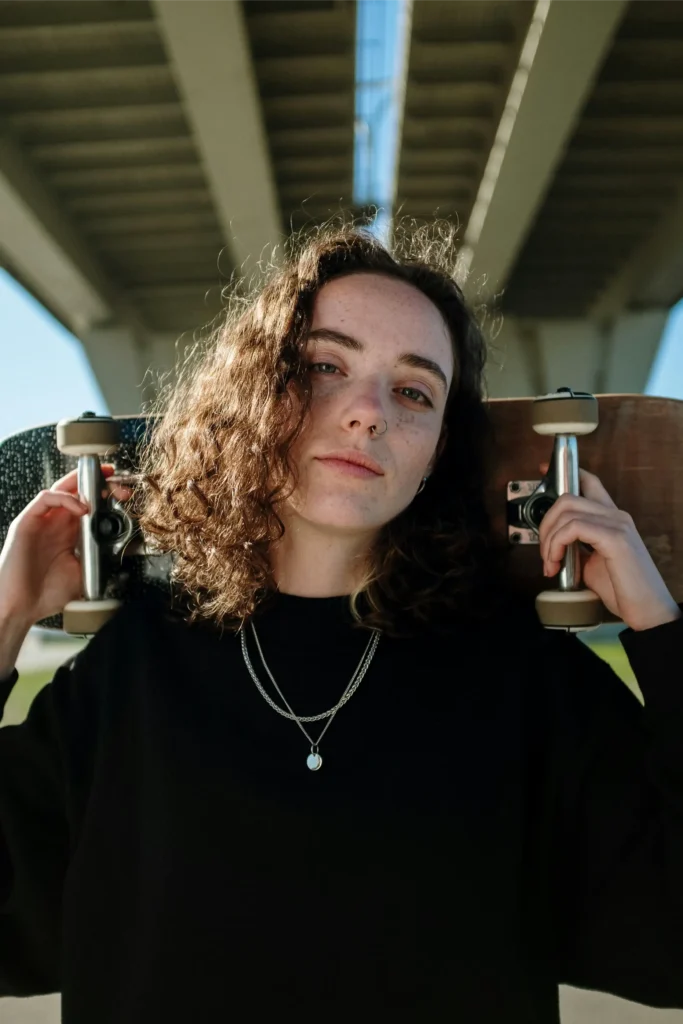
SAINT TMS For Depression
The SAINT™ depression treatment Protocol, which was developed at Stanford University and published in the American Journal of Psychiatry, also utilized an accelerated treatment schedule. Stanford researchers found that “SAINT™” or “SAINT treatment for depression” significantly reduced depressive symptoms and suicidal ideation in patients with treatment-resistant depression within 5 days, without negative cognitive side effects.” Researchers found that, when using Stanford Accelerated Intelligent Neuromodulation Therapy (SAINT™ TMS Protocol), close to 80% of participants no longer met criteria for clinical depression, while roughly 95% of participants no longer experienced suicidal ideation. While Bespoke Treatment does not purport to use the exact same software, hardware, or cloud computing as the SAINT™ depression treatment Protocol, our team has reviewed the data carefully and has made some additional modifications to increase response–especially for those suffering from multiple diagnoses, such as anxiety disorders.

The Accelerated TMS Protocol
The actual accelerated TMS protocol is relatively simple. Each TMS session starts off at 10 minutes in length, followed by a 50-minute break. During the break, patients are welcome to work, grab a bite, go for a walk, or even take a nap in our comfortable psychedelic therapy rooms. Treatment is usually administered with Theta Burst Stimulation (TBS), a type of TMS where the pulses mimic the brain’s endogenous rhythms when learning.
However, the SAINT TMS studies have challenged our conceptions about using imaging to support TMS. A very unique component of the SAINT™ protocol was the use of a functional MRI (“fMRI”) to find the specific part of the LDLPFC that is deeply connected to a different part of the brain called the subgenual Cingulate Cortex (sgACC). In depression, the sgACC is unstable and overactive, leading to more severe symptoms of depression as the activity of this region increases. When we increase activity in the LDLPFC, it becomes stronger and can successfully control and inhibit the sgACC, leading to balance and harmony between these two brain regions. An fMRI scan can help us target this exact spot on the LDLPFC to ensure that the treatment is customized for each patient, giving them the best chance of success possible. However, Bespoke Treatment has done Accelerated TMS for many years without an MRI or fMRI, and we have witnessed close to 100 patients enter remission without brain scans.
Accelerated TMS Reviews & Results
We have ample data on Accelerated TMS at this point, and it seems to be a favorable method to undergo TMS for the right person. Theta burst stimulation has been studied in TMS since 2005, and was FDA cleared as an alternative for longer protocols in 2018. In our experience, most people notice results approximately mid-week (if starting treatment on Monday), while some very rarely notice major changes on a delay, such as one week after ending TMS. It’s common for us to hear that it feels like “the weight has been lifted” when the effects of TMS start kicking in.
Accelerated TMS Side Effects
The most common TMS side effects reported are temporary fatigue and headaches. In general, the side effects of TMS treatment for depression don’t differ meaningfully compared to traditional TMS. Some transient anxiety and sleep issues are not uncommon, and TMS treatments at clinics like Bespoke Treatment are usually well-equipped to target those specific symptoms with TMS once they surface. Other patients may experience mild facial movement during the stimulation, which ceases immediately once the treatment is over.
@letthemvent The update everyone has been waiting for. #acceleratedtms #tmsbrainhealth #tmstreatment #anxiety #depression #treatmentresistantdepression ♬ Chasing Cars – Snow Patrol
Optimized, Neuroplastogen-Enhanced (One Day) TMS
A new protocol called the Optimized, Neuroplastogen-Enhanced techniques in Depression (ONE-D) has recently been FDA Approved. This one day protocol consists of 20 TMS sessions, each lasting 3 minutes. These sessions take place every 30 minutes over the course of 9.5 hours. In addition to receiving TMS, patients take two medications an hour beforehand:
125mg of D-cycloserine, which binds to neurons important for strengthening and forming new connections.
Patients also take 20 mg of Lisdexamfetamine, which is a stimulant that also aids in increased brain activity. After the 20 TMS sessions are over, patients are free to leave the clinic and go about their lives. While some patients may need follow-up treatment, the data suggests that most will not need additional TMS after the day is over.
The results of the study are extremely promising – a substantial number of patients met both response and remission criteria, meaning their symptoms decreased so much over one day that they no longer fit criteria for having depression and anxiety. Additionally, the number of patients who met response and remission criteria increased over time from the 1 week to even 12 week mark.
For example, 1 week after treatment, 43.8% of patients met response criteria, and 18.8% met remission criteria for depression. After 12 weeks, this number increased to 92.6% and 77.8%, respectively. Similar results were shown for anxiety, where 43.3% of percent of people initially responded and 20% initially met criteria for remission, but after 12 weeks, 91.7% of people responded and 90% of people met criteria for remission.
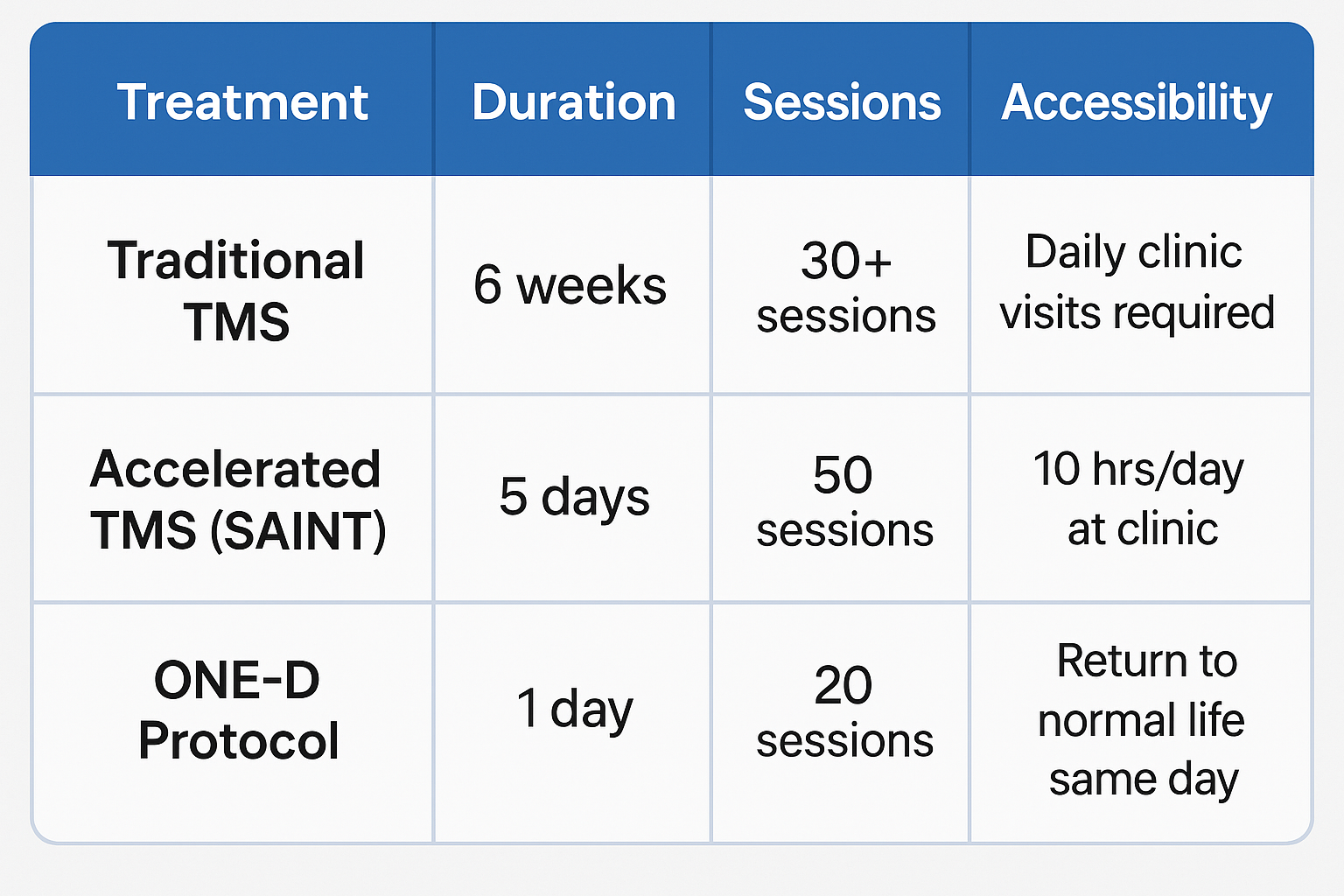
Join The Waitlist Today
If you’re interested in the ONE-D Accelerated TMS protocol, please contact us to join the waitlist today. Bespoke Treatment is planning to start offering this treatment as soon as summer 2025.
Price of Accelerated TMS & Cost of SAINT TMS
If you’re wondering how much Accelerated TMS costs, you’re in the right place. While we don’t have data on clinics that are not ours, the average price seems to range quite a bit between $10,000 and $40,000 depending on the clinic setup, location, if imaging is involved, and whether or not the FDA cleared SAINT system is used. For those looking for a TMS center near them, it might be more affordable to travel to one than to stay home at the local TMS clinic nearby.
Is Accelerated TMS or SAINT TMS Covered By Insurance?
While standard TMS is almost always covered by insurance, accelerated TMS and SAINT TMS are usually not covered by insurance. However, there are some important exceptions. Workers compensation carriers may cover Accelerated TMS, as long as it is authorized by the adjustor. Veterans with TriWest and active duty military members with TriCare will be fully covered for fMRI Guided TMS starting July 1, 2024. Other insurance companies may cover Accelerated TMS on a limited, case by case basis.
Pros and Cons of Accelerated TMS
The 5 day program is recommended in general for several situations, but please call us to determine if it is right for you. Traditional TMS requires daily sessions, so you must live near a clinic and be able to drive there daily for 8 weeks. This can be impractical for many, so the 5 day treatment could be right for you. Some patients and psychiatrists prefer the standard schedule as it can be customized to a much more personal level.
Pros of Accelerated TMS
- Remission or significant reduction in depression can be achieved in less than a week
- Huge reduction in suicidal ideation can be achieved in less than a week
- Drug-free treatment for depression
- Results for many are more dramatic than standard TMS schedule
- If remission isn’t achieved, the sufferer knows that TMS isn’t the right solution without an 8-week commitment and can seek other alternatives like ketamine infusions.
Cons of Accelerated TMS
- Usually not covered by insurance
- Difficult to regulate sleep for insomnia sufferers
- Possible temporary mild headaches or fatigue
- Still considered to be experimental, meaning all side-effects have not been fully explored
Call or contact us today to find out if the Accelerated TMS program is right for you, or any of our other alternative depression treatment options including standard TMS therapy, ketamine, and/or our outpatient depression program.
What Should I Expect During Accelerated TMS Therapy?
After an evaluation from one of our psychiatrists or clinicians on our team, we’ll schedule the week for you. Accelerated TMS always begins on Monday and ends on Friday, so if a patient is traveling to us, we recommend they arrive over the weekend and leave the following weekend.
The first session of the day is always dedicated to calibrating the device to your brain. This involves discovering the minimal dose of TMS to elicit a response in your brain cells by intentionally causing one of your fingers to “twitch.” During your sessions, you sit in a comfortable chair with the TMS device positioned securely on your head. Most patients report a light tapping sensation on their forehead, but it is not painful. We are with you during every single treatment session and are always available should you have any questions or concerns.
DISCLAIMER: SAINT™ is a trademark of The Board of Trustees of the Leland Stanford Junior University (“Stanford”) and has exclusively licensed such mark to Magnus Medical. Bespoke Treatment is neither endorsed nor licensed by Stanford or Magnus Medical, nor claims to be offering the SAINT protocol as prescribed by Stanford University et. al. or Magnus Medical.
Experience Relief With Accelerated TMS Therapy
If you are searching for the best TMS therapy provider in Los Angeles and Santa Monica, Bespoke Treatment is the right place for you. Contact our mental health professionals to find the best treatment options.
Book Online

